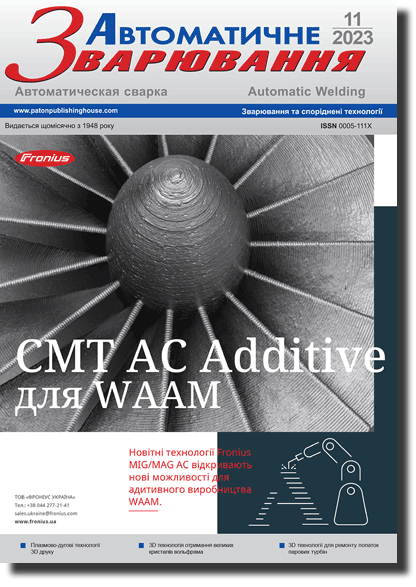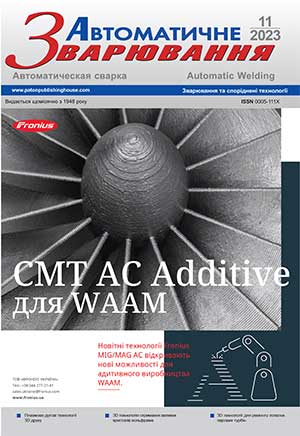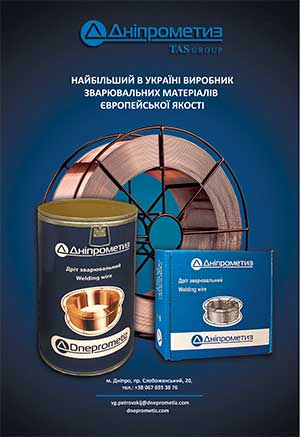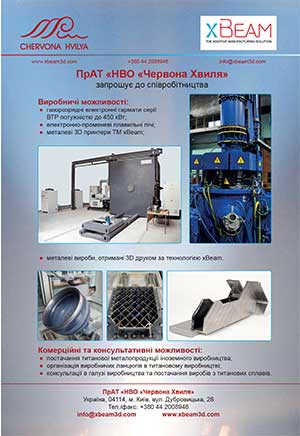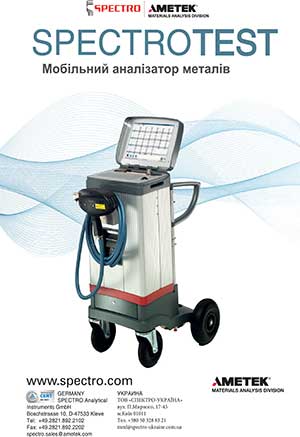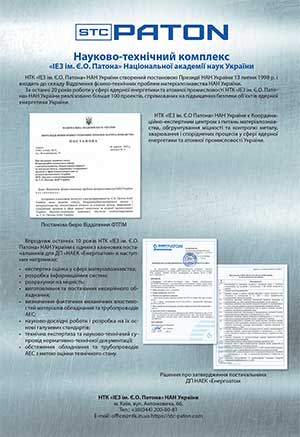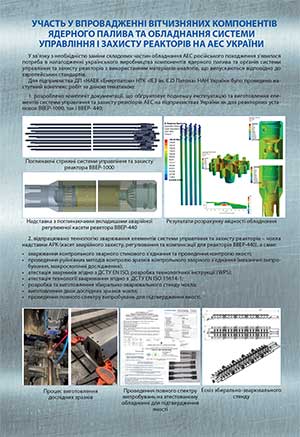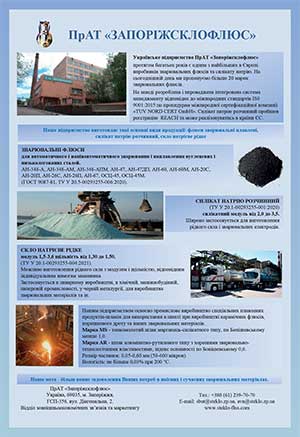| 2023 №11 (01) |
DOI of Article 10.37434/as2023.11.02 |
2023 №11 (03) |
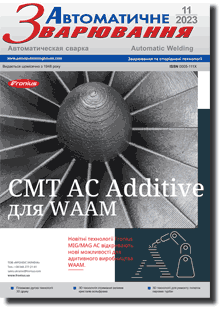
"Avtomatychne Zvaryuvannya" (Automatic Welding), #11, 2023, pp. 23-31
Influence of GMAW and PAW methods of additive arc surfacing and shielding gas composition on surface geometry and metal structure
V.V. Kvasnytskyi, I.M. Lagodzinskyi
NTUU «Kyiv Igor Sikorsky Polytechnic Institute. 37 Beresteiska Ave., 03056, Kyiv. E-mail: kvas69@ukr.netWith development of Wire Arc Additive Manufacturing (WAAM) technologies there is the need to ensure stable quality characteristics of spatial products, and it is desirable to obtain a final surface with minimal geometrical inhomogeneity. Arc surfacing, in particular the process with short-circuiting (Cold Metal Transfer – CMT), and pulse-arc surfacing (Pulse process) allow greater control of weld pool melt behaviour, and reducing material losses for spatter and burn-out, which ensures higher productivity of the process. At the same time, investigations of the regularities of the influence of arc melting methods, in particular CMT, Pulse and PAW technologies, and composition of shielding gas atmosphere on the formed layer geometry, deposited metal structure and proneness to defect formation are urgent. Analysis of sample geometry indicates that the shielding gas mixture composition has an essential influence on the deposited layer height, irrespective of the surfacing method (CMT/Pulse). So, for М11 mixture the height of individual beads increases by 0.4…11.7 %, compared to use of М21 mixture. Application of pulsed current leads to 10…11 % increase in the bead width, compared to CMT process. Metallographic studies reveal product structure typical for multilayer surfacing. No clear boundary between the deposited metal layers was found. 18 Ref., 2 Tables, 9 Fig.
Keywords: WAAM, GMAW, Cold Metal Transfer, plasma, additive technologies, 09G2S, layer-by-layer surfacing, shielding gas mixture
Received: 25.10.2023
References
1. Ding, D., Pan, Z., Cuiuri, D. et al. (2016) Adaptive path planning for wire-feed additive manufacturing using medial axis transformation. J. of Cleaner Production, 133, 942-952. https://doi.org/10.1016/j.jclepro.2016.06.0362. Rodrigues, T.A., Duarte, V., Miranda, R.M. et al. (2019) Current status and perspectives on wire and arc additive manufacturing (WAAM). Materials, 12(7), 1121. https://doi.org/10.3390/ma12071121
3. Pan, Z., Ding, D., Wu, B. et al. (2018) Arc welding processes for additive manufacturing: A review. Transactions on Intelligent Welding Manufacturing, 1, 3-24. https://doi.org/10.1007/978-981-10-5355-9_1
4. DebRoy, T., Wei, H.L, Zuback, J.S. et al. (2018) Additive manufacturing of metallic components - Process, structure and properties. Progress in Materials Science, 92, 112-224. https://doi.org/10.1016/j.pmatsci.2017.10.001
5. Kvasnytskyi, V., Korzhyk, V., Lahodzinkyi, I. et al. (2020) Creation of volumetric products using additive arc cladding with compact and powder filler materials. IEEE 10th International Conference Nanomaterials: Applications & Properties (NAP), pp. 02SAMA16-1-02SAMA16-5. https://doi.org/10.1109/NAP51477.2020.9309696
6. Xiong, J., Li, Y., Li, R., Yin, Z. (2018) Influences of process parameters on surface roughness of multi-layer single-pass thin-walled parts in GMAW-based additive manufacturing. J. of Materials Processing Technology, 252, 128-136. https://doi.org/10.1016/j.jmatprotec.2017.09.020
7. Graf, M., Hälsig, A., Höfer, K. et al. (2018) Thermo-mechanical modelling of wire-arc additive manufacturing (WAAM) of semi-finished products. Metals, 8(12), 1009. https://doi.org/10.3390/met8121009
8. Ogino, Y., Asai, S., Hirata, Y. (2018) Numerical simulation of WAAM process by a GMAW weld pool model. Weld World, 62, 393-401. https://doi.org/10.1007/s40194-018-0556-z
9. Rao, Z.H., Liao, S.M., Tsai, H.L. (2010) Effects of shielding gas compositions on arc plasma and metal transfer in gas metal arc welding. J. of Applied Physics, 107(4), 044902. https://doi.org/10.1063/1.3291121
10. Gurcik, T., Kovanda, K., Rohan, P. (2019) Influence of shielding gas on geometrical quality of WAAM technology. METAL 2019 - 28th International Conference on Metallurgy and Materials, Conference Proceedings, pp. 715-721. https://doi.org/10.37904/metal.2019.871
11. Bishal, S., Pudasaini, N., Roy, S. et al. (2022) Altering the supply of shielding gases to fabricate distinct geometry in GMA additive manufacturing. Applied Sciences, 12(7), 3679. https://doi.org/10.3390/app12073679
12. Mvola, B., Kah, P. (2016) Effects of shielding gas control: welded joint properties in GMAW process optimization. The International J. of Advanced Manufacturing Technology, 88(9-12), 2369-2387. https://doi.org/10.1007/s00170-016-8936-2
13. Gouda, M., Takahashi, M., Ikeuchi, K. (2005) Microstructures of gas metal arc weld metal of 950 MPa class steel. Science and Technology of Welding and Joining, 10(3), 369- 377. https://doi.org/10.1179/174329305X40714
14. Menzel, M. (2003) The influence of individual components of an industrial gas mixture on the welding process and the properties of welded joints. Welding International, 17(4), 262-264 https://doi.org/10.1533/wint.2003.3111
15. Ebrahimnia, M., Goodarzi, M., Nouri, M., Sheikhi, M. (2009) Study of the effect of shielding gas composition on the mechanical weld properties of steel ST 37-2 in gas metal arc welding. Materials & Design, 30(9), 3891-3895. https://doi.org/10.1016/j.matdes.2009.03.031
16. Zhao, Y., Shi, X., Yan, K. et al. (2018) Effect of shielding gas on the metal transfer and weld morphology in pulsed current MAG welding of carbon steel. J. of Materials Processing Technology, 262, 382-391. https://doi.org/10.1016/j.jmatprotec.2018.07.003
17. Spencer, J.D., Dickens, P.M., Wykes, C.M. (1998) Rapid prototyping of metal parts by three-dimensional welding. Proceedings of the Institution of Mechanical Engineers, Part B: J. of Engineering Manufacture, 212(3), 175-182. https://doi.org/10.1243/0954405981515590
18. Tokihiko, K., Rinsei, I., Koichi, Y., Yoshinori, H. (2009) Development of low spatter CO2 arc welding process with high frequency pulse current. Science and Technology of Welding and Joining, 14(8), 740-746. https://doi.org/10.1179/136217109X449238
Advertising in this issue:
The cost of subscription/purchase order journals or individual articles
| Journal/Currency | Annual Set | 1 issue printed |
1 issue |
one article |
| TPWJ/USD | 384 $ | 32 $ | 26 $ | 13 $ |
| TPWJ/EUR | 348 € | 29 € | 24 € | 12 € |
| TPWJ/UAH | 7200 UAH | 600 UAH | 600 UAH | 280 UAH |
| AS/UAH | 1800 UAH | 300 UAH | 300 UAH | 150 UAH |
| AS/USD | 192 $ | 32 $ | 26 $ | 13 $ |
| AS/EUR | 180 € | 30 € | 25 € | 12 € |
| SEM/UAH | 1200 UAH | 300 UAH | 300 UAH | 150 UAH |
| SEM/USD | 128 $ | 32 $ | 26 $ | 13 $ |
| SEM/EUR | 120 € | 30 € | 25 € | 12 € |
| TDNK/UAH | 1200 UAH | 300 UAH | 300 UAH | 150 UAH |
| TDNK/USD | 128 $ | 32 $ | 26 $ | 13 $ |
| TDNK/EUR | 120 € | 30 € | 25 € | 15 € |
AS = «Automatic Welding» - 6 issues per year;
TPWJ = «PATON WELDING JOURNAL» - 12 issues per year;
SEM = «Electrometallurgy Today» - 4 issues per year;
TDNK = «Technical Diagnostics and Non-Destructive Testing» - 4 issues per year.




